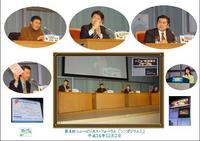One of the great things about going to OSCON was getting to know some of the interesting people involved in the various open source projects. The OSI team and Mitchell Baker, the Chief Lizard Wrangler of the Mozilla Foundation introduced me to a lot of people in the context of having joined both of their boards recently.
One meeting that Mitchell set up was with Allison Randal - the president of the Perl Foundation, Zak Greant - the former MySQL AB Community Advocate, and Cliff Schmidt who until recently managed standards and open source strategy for BEA's WebLogic Workshop product. Since we are going through various changes right now at the Mozilla Foundation, Mitchell has been talking to various people to try to get thoughts on how successful open source projects are managed. She's trying to get as much input as possible to as the Mozilla Foundation grows and transforms. I've recently been invited into the conversation and it is fascinating.
This particular meeting, which reflected some of the wonder I felt during all of OSCON, was an eye opener. Mitchell asked everyone to introduced themselves and explain their roles and what was required in their roles. Allison was first and Mitchell recalls on her blog that it went something like this:
mitchell's blog
So, for example, what does it take to guide a foundation, as Allison does? Well, it takes a sense of people, and good intuition for what sorts of seemingly simple topics are likely to generate giant tensions if not handled delicately. It takes knowing when to let an issue fade away and when to make sure it is completely resolved. It takes an ability to find a common ground, and enough presence (or trust, or reputation, or *something*) to get people to consider that common ground.
It turns out that everyone had job descriptions and skills that were quite similar.
This reminds me of the Leader-Follower essay by Dee Hock - the founder of VISA. (You should read the whole thing.)
Leader-Follower
True leaders are those who epitomize the general sense of the community — who symbolize, legitimize, and strengthen behavior in accordance with the sense of the community — who enable its conscious, shared values and beliefs to emerge, expand, and be transmitted from generation to generation-who enable that which is trying to happen to come into being. The true leader's behavior is induced by the behavior of every individual who chooses where they will be led.
His notion of leadership is bottom-up, community and coordination oriented and not focused on the exercise of authority.
What I saw in the leaders of open source projects and in the communities in general was a very strong sense of this kind of leadership. Open source projects have their share of politics and petty problems and clearly leaders of other types of organization do and should exhibit these sorts of leadership traits. However, I definitely saw something special in these open source leaders which reminded me of the leaders that Dee Hock described. They had strong ethics, were humble, were extremely sensitive of the needs of their community and lead more through coordination and management of processes than through exercise of authority. This was in stark contract to some of the conversations I have had at various CEO forums where people talked about "human resources" as if they were cogs and seemed to feel that the CEO had some divine right to more money and more power. Again, I would add that there are a great number of exceptions in both groups, but generally speaking, the conversations with the open source leaders made me feel like I was seeing the future of organizations compared to my experience with CEOs of normal for-profit companies.
I think that the Mozilla Foundation and the success of open source is a test and will be an example of a new kind of organizational management style which I believe will have lessons applicable to all kinds of organizations. (Note: DBA tag.) Enlightened leaders in other areas are also developing methods that involve treating their staff, customers and other stakeholders as a communities, but this still appears to be the exception, not the norm.
Technorati Tags: dba
![Joi Ito [logo]](/_site/img/joi-ito-logo-300.png)











 Since I was the chair of the Forum planning committee this year, I had to give the opening speech. (not really a speech, but an announcement) I had been dreading this for a whole year, but it's finally over. I was visibly nervous, but I got through it OK.
Since I was the chair of the Forum planning committee this year, I had to give the opening speech. (not really a speech, but an announcement) I had been dreading this for a whole year, but it's finally over. I was visibly nervous, but I got through it OK.